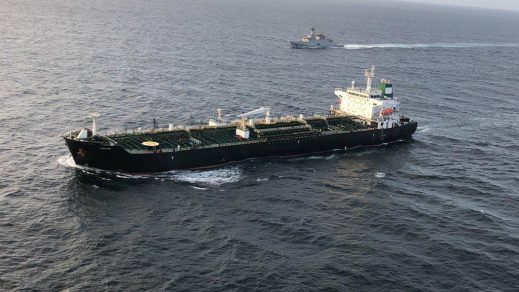In late April, five Iranian oil tankers set out for Venezuela to supply gasoline and additives so that the Caribbean nation can produce its own fuel, which today faces unilateral aggressions and coercive measures by the United States Government.
Fortune, the first of the tankers, arrived on Saturday night in Venezuelan waters, escorted by vessels of the Venezuelan Armed Forces, and later it arrived at the port of the El Palito refinery, Carabobo state (north-central), as reported by the Oil Minister, Tareck El Aissami.
The second ship, Forest, entered venezuelan waters on Monday. The third, Petunia, did the same on Tuesday. While the other two vessels, Faxon and Clavel, are estimated to arrive on May 27 and June 1, respectively.
The arrival of these ships occurs amid an acute shortage of gasoline in the Latin American nation, aggravated by the social and collective quarantine decreed to prevent the COVID-19 pandemic since March 16.
In the vicinity of the service stations there are endless queues of cars waiting for several days to fill up their tanks. An unusual scene in a country that became famous for «selling» the cheapest gasoline in the world.
The crisis even affects the oil supply so that the agricultural production tasks can function and for the transport of food from the rural sectors to the markets.

Why did Venezuela have to import fuel?
Venezuela sees the need to import diesel, gasoline and the products necessary to complete the local production process of these fuels, due to the deepening of sanctions and the economic blockade applied by the United States Government.
Although the nation produces oil and its derivatives, the infrastructure and operation of the state-owned Petroleos de Venezuela (PDVSA) have been seriously affected by the economic crisis. In addition, several of the components of the gasoline that is produced in that country are imported.
The imposition of unilateral coercive measures by the Donald Trump administration, with the purpose of forcing the exit of the Venezuelan president, Nicolás Maduro, prevent the importation of those supplies that the Caribbean country needs.
PDVSA’s total crude processing capacity has been reduced from three million to one million barrels per day (bpd). As a result of the blockade, the main refineries in the country show equipment obsolescence and deterioration of the facilities.
For example, the Paraguaná Refining Complex, the largest in the country and in the continent, with a capacity to process up to 645,000 bpd, today produces less than half, due to the lack of parts that have been damaged or deteriorated.

Effect of sanctions
The impact of US policy exacerbates the situation, and as time passes and coup plans and destabilizing actions fail, Trump decides to tighten the fence to strangle the Venezuelan economy.
«Imperialist sanctions, especially those focused on the oil sector, have aggravated and made this situation more pressing. The most severe of the sanctions was executed in January 2019, when an unprecedented oil embargo for Venezuela was finalized. In addition, the sanctions prohibit the export to Venezuela of diluents that PDVSA uses to process heavy and extra-heavy crude, and limit the trade in bonds», said Milton D´León, analyst and editor of the portal La Izquierda Diario.
Due to the sanctions, PDVSA is also unable to export or import oil derivatives from the United States, such as light gasoline.
In addition, any company or country that establishes a commercial relationship with Venezuela is subject to sanctions by Washington.

As a consequence of the sanctions, Venezuela is unable to buy gasoline abroad, another reason why the national supply has been compromised.
“If they can’t find who will buy their oil, it will be very difficult to find who will sell them gasoline. Hence the agreements reached with Iran, another sanctioned country. Previously, Venezuela had managed to evade the impact of these sanctions a little by exchanging with India, but that route was also hindered by imperialist pressure», explained D’León.

Solidarity from Iran
In the midst of the coronavirus pandemic, Venezuela suffers from a lack of fuel that compromises the production and transport of food, since several tasks require the use of gasoline or diesel.
Faced with this emergency, the Bolivarian nation had the solidarity of Iran, an allied country with which it has cooperation agreements that cover different sectors, including energy, and which also faces sanctions from Washington.
Despite threats from the Trump government, Iran loaded the five tankers with 1.5 million barrels of gasoline and additives destined for Venezuela, valued at $ 45.5 million, which will allow the refining and production capacity of fuel in the caribbean nation.
When supervising the unloading of fuel, additives and spare parts from the Fortune vessel, at the El Palito refinery, Minister Tareck El Aissami assured that this act of solidarity is an expression of the self-determination of both peoples.
«What a great fortune to have Iran in these times! What great fortune for Venezuela to be respected in the international context (…) This is a fact that shows the solidarity of the peoples. Thank you (Iran) for your bravery, for your decision», he said, quoted by Globovisión.
El Aissami reaffirmed the need for hegemonic domination intentions to cease over peoples who are seeking their own path and independence.
For his part, the Persian ambassador to Venezuela, Hojjatollah Soltani, recalled that in 2008 Tehran suffered a similar situation of blockade and persecution, and then, Venezuelan President Hugo Chávez, made the decision to send ships loaded with gasoline to Iran.
«From Venezuela we ratify the path of diplomacy for peace, Venezuela is a people of peace and love, who want to continue opening the horizon to a future time, without wars, without sanctions, without persecution. Iran has that determination. This has to stop! The intentions of domination in the world over the peoples that seek their own future must cease», he said.

The US has lost the battle but the war goes on
The international analyst Iñaki Gil de San Vicente indicated that the arrival of the Persian oil tankers, laden with gasoline at Venezuelan ports, represents a triumph, not only of Iran and Venezuela, but of all the nations that defend their right to sovereignty and self-determination. .
However, he made it clear that «winning a battle, as the peoples of Iran, Venezuela and all humanity have done, does not mean that the war has been won».
Speaking to HispanTV, the analyst assured that Washington’s siege policy is collapsing and, proof of this, is that the Trump government has had to «eat up all the threats it had launched» against Iranian ships carrying fuel to Venezuela.
«Many peoples of the world are seeing that, just as Iran has been able to send vital resources to Venezuela, it can currently do the same with other countries that need it and vice versa», said Gil de San Vicente.
In the political scientist’s opinion, the strategy of energetically drowning Venezuela, a country rich in oil, has failed. Likewise, he warned that «the general project of the United States to dominate the world, with the support of other powers, has not failed, but has not won either».
«We do not have to rest on our laurels, because there is still a tremendous war with many battles, and it is that war that we really have to win», he stressed.




